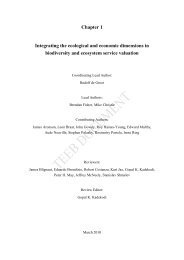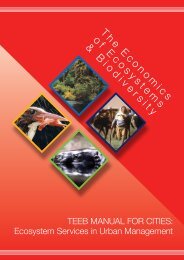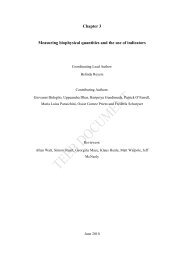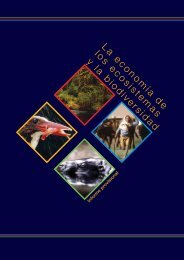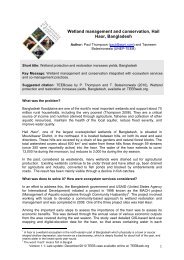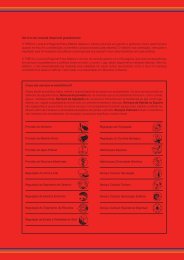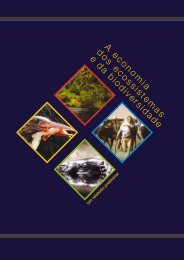Download (PDF, 6.71MB) - TEEB
Download (PDF, 6.71MB) - TEEB
Download (PDF, 6.71MB) - TEEB
You also want an ePaper? Increase the reach of your titles
YUMPU automatically turns print PDFs into web optimized ePapers that Google loves.
Box 10.2: Collecting and synthesising evidence<br />
on the values of ecosystem services<br />
The <strong>TEEB</strong> D0 report (2009) is analysing a large<br />
number of economic values that have been<br />
estimated for the main types of ecosystem<br />
services around the world, making use of<br />
existing databases and the valuation literature.<br />
It aims to provide a synthetic picture of values<br />
for different services in different regions and<br />
socio-economic conditions (population density,<br />
income level) to provide an information pool<br />
for future assessments. This data collection<br />
and analysis places the values in their context,<br />
this facilitates their interpretation and use,<br />
notably through benefit transfer.<br />
Over 1,100 values have been collected so far,<br />
covering 10 biomes and 22 ecosystem services.<br />
These are being organised based on geographical<br />
and socio-economic criteria. Work is still<br />
ongoing and will be completed in 2010.<br />
Source: <strong>TEEB</strong> D0, Chapter 7<br />
Finally, it should be stressed that economic<br />
valuation has its limits and can ever only be one<br />
input into the decision process. Estimated<br />
values of non-market goods and services remain<br />
approximations and despite the substantial progress<br />
made, no method is perfect. Besides, economic<br />
value is not an adequate measure of how important<br />
a service may be to human survival. Nevertheless,<br />
monetary values are highly attractive because they<br />
allow for comparisons with financial costs on the<br />
basis of a single currency or on a like-for-like basis.<br />
This reduces the potential for bias and the risk of<br />
overlooking real environmental costs in decisions<br />
affecting, for example, land use. Even incomplete<br />
valuation not covering the full range of ecosystem<br />
services can provide useful information for decision<br />
makers when compared with the benefits from conversion.<br />
RESPONDING TO THE VALUE OF NATURE<br />
10.1.2 MARKETS LIMITATIONS AND<br />
THE ROLE OF PUBLIC POLICIES<br />
Markets fail to capture most ecosystem service<br />
values. Existing price signals only reflect – at best –<br />
the share of total value that relates to provisioning<br />
services like food, fuel or water and their prices may<br />
be distorted. Even these services often bypass<br />
markets where carried out as part of community<br />
management of shared resources. The values of<br />
other ecosystem services are generally not reflected<br />
in markets apart from a few exceptions (such as<br />
tourism).<br />
This is mainly explained by the fact that many ecosystem<br />
services are ‘public goods’ or ‘common<br />
goods’: they are often open access in character and<br />
non-rival in their consumption. In addition, their<br />
benefits are felt differently by people in different<br />
places and over different timescales. Private and<br />
public decisions affecting biodiversity rarely consider<br />
benefits beyond the immediate geographical area<br />
(e.g. from watershed protection). They can also overlook<br />
local public benefits (e.g. provision of food and<br />
fuel) in favour of private benefits (e.g. from commercial<br />
timber extraction), even when local livelihoods<br />
are at stake, or focus on short-term gains to the<br />
detriment of the sustained supply of benefits over<br />
time (e.g. in the case of fisheries). Benefits that are<br />
felt with a long-term horizon (e.g. from climate regulation)<br />
are frequently ignored. This systematic<br />
under-valuation of ecosystem services and<br />
failure to capture the values is one of the main causes<br />
underlying today’s biodiversity crisis. Values that are<br />
not overtly part of a financial equation are too often<br />
ignored.<br />
Public policies therefore have an essential role<br />
to play in ensuring that the main types of benefits are<br />
identified and taken into account in decisions – to<br />
avoid grossly underestimating the overall value of<br />
conserving or sustainably using biodiversity and<br />
ecosystem services, and to recognise their particular<br />
importance to the poor who most depend upon them.<br />
Public policies need to make markets work better, by<br />
integrating ecosystem service values where possible<br />
into price signals, and to put adequate institutions,<br />
regulations and financing in place.<br />
<strong>TEEB</strong> FOR NATIONAL AND INTERNATIONAL POLICY MAKERS - CHAPTER 10: PAGE 6



